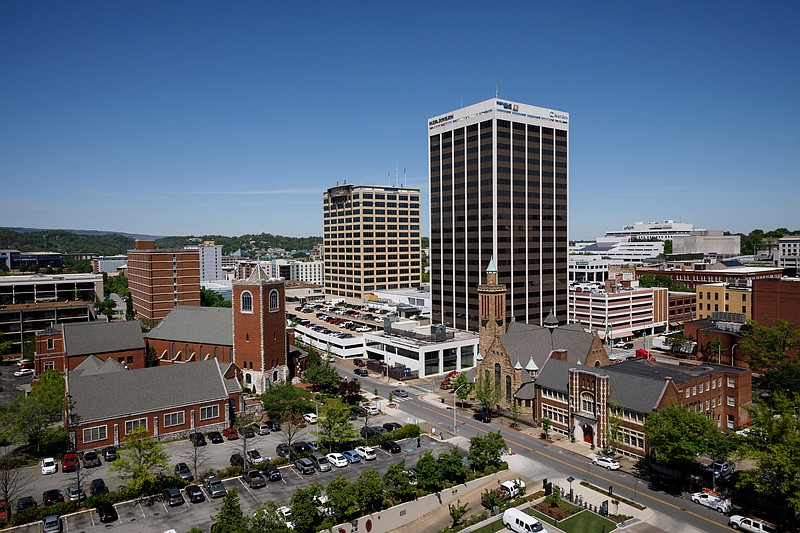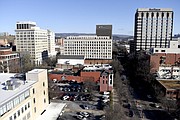One of the consultants said it's like putting the sparkle and shine back in some areas.
Enough downtown Chattanooga landowners appear to support the idea of taxing themselves to create a business improvement district to push the idea over the finish line, an official says.
Kim White, president of the nonprofit downtown redevelopment group River City Co., said she expects the proposal to have passed the needed level of support when petition results go before the Chattanooga City Council in early May.
"One of the consultants said it's like putting the sparkle and shine back in some areas," she said. "It will be nicer to have a higher level of services."
A business improvement district in the city center would provide $1 million annually to support services making the area cleaner and safer, as well as enhanced beautification and special projects, supporters told Times Free Press editors and reporters on Tuesday.
The district would include about 284 parcels in a footprint from Riverfront Parkway to 11th Street and U.S. Highway 27 to Cherry Street.
Some big landholders downtown aren't part of the business improvement district area. TVA, BlueCross BlueShield of Tennessee and Warehouse Row are all outside the district.
Most of Unum Group's large holdings downtown are excluded from the district, according to officials.
Jim Sabourin, the Chattanooga-based insurer's senior vice president of corporate communications, said company officials believe such districts are more appropriate for retail and restaurants than large office buildings.
"I would also add that we have 3,000 employees, take pride in the downtown area and support it in many other ways," he said.
Matt McGauley, chief executive of downtown landowner Fidelity Trust Co., said there were a lot of details he had to see related to a business improvement district before he could support it.
Also, he said, there have been a lot of conversations with tenants in commercial buildings in the proposed district.
"Tenants are not signing petitions but must be given a voice," he said.
McGauley said most are willing to pay a little extra money if it comes back in a cleaner, safer downtown.
Mitch Patel, CEO of Chattanooga-based Vision Hospitality Group, said he was familiar with business improvement districts in other cities where his company has hotels, such as Nashville and Louisville.
He expected annual costs for the Chattanooga district of $8,000 to $10,000 for one hotel.
"We feel that's a marginal amount," Patel said, adding that over time the district should help boost visitor experience and hotel occupancy.
Meanwhile, some property owners have questioned if other services, such as parking, ought to be the focus of the district. Also, they've questioned if city services will continue in the area, something that supporters indicated will occur in an agreement with City Hall.
Earlier this year, petitions were sent to property owners in the proposed district to gauge their support. To OK the district, it had to gain approval from the owners representing at least 67% of the total assessed value of property in the district and 50% of the total number of landowners, White said.
For commercial and nonprofit landowners, annual assessments would be 9 cents per square foot, of either the lot or building size, whichever is greater, plus $4.95 per linear foot of lot frontage. For owners of residential properties such as townhouses or condominiums, they'd pay $150 per unit.
If the city council signs off on the business improvement district, work would start next year. All the property owners in the district would be required to pay, including nonprofits. Only government isn't required, but city and Hamilton County officials are supportive, White said.
Within the district, plans call for the hiring of so-called "ambassadors" who would provide "extra feet on the street," White said. She said they could work with homeless people and even consult with social service agencies on their behalf. Ambassadors would have no law enforcement responsibilities, White said.
A business improvement district board of property owners would oversee the spending of the assessments, which would appear on property tax bills. Failure to pay could result in a lien, White said.
She said a district office could be set up at River City's headquarters downtown to handle day-to-day operations.
Contact Mike Pare at mpare@timesfreepress.com or 423-757-6318. Follow him on Twitter @MikePareTFP.

